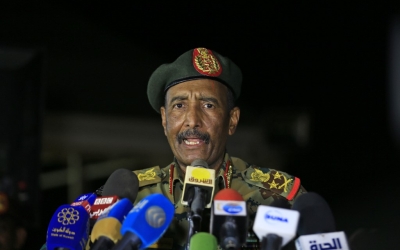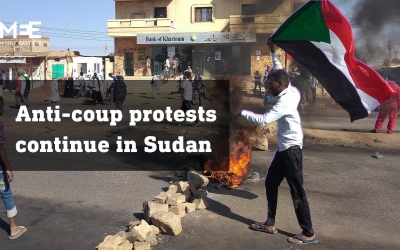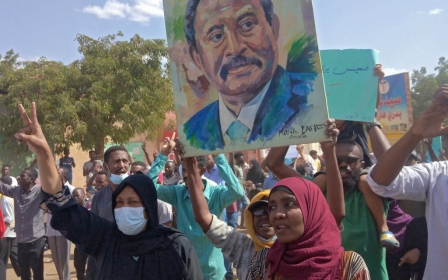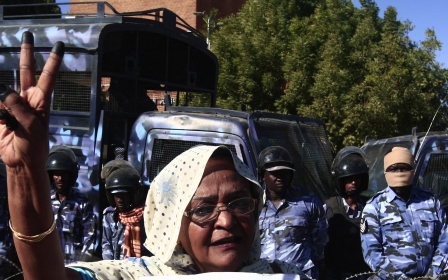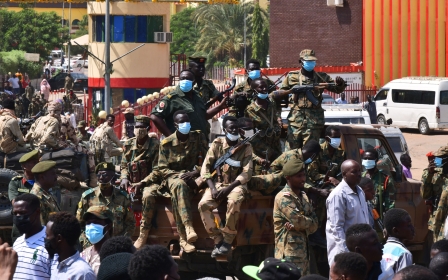Sudan coup: Protesters shot dead as 'half a million' march against military rule
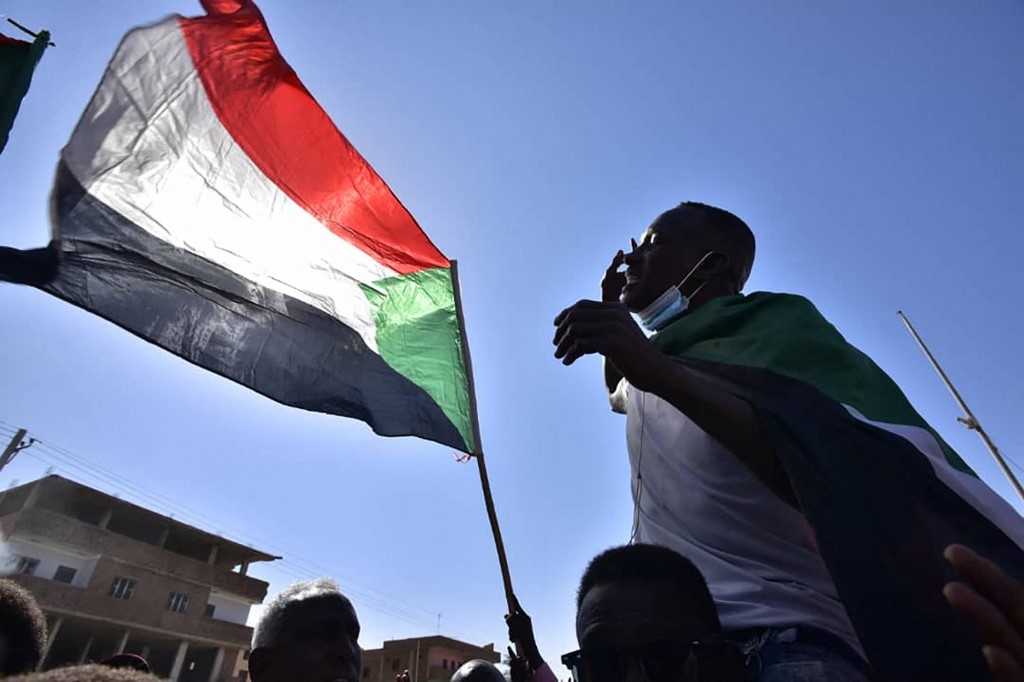
At least five people were killed at pro-democracy protests in Sudan on Saturday, following three weeks of military rule, internet shutdowns and violence from authorities.
According to the Central Committee of Sudanese Doctors, which is aligned with the protest movement, four protesters were fatally shot, while a fifth suffocated on tear gas. At least 40 protesters were seriously wounded.
More than half a million people took part in Khartoum demonstrations, according to Middle East Eye's correspondent on the ground, Mohammed Amin, who said that at one point the march stretched on for more than 12 miles.
The protest came two days after the military formed a ruling council excluding the country's main civilian bloc.
Army chief Abdel Fattah al-Burhan arrested Prime Minister Abdalla Hamdok on 25 October, along with several other key officials, and seized control of the country.
On Saturday, protesters took to the streets, chanting anti-military slogans such as "the people want the fall of the regime" and holding up pictures of Hamdok, now a symbol of resistance to military rule. At least 20 protesters have been killed in total since the army takeover.
'It was really intense'
Tear gas was deployed early in the day, while authorities blocked roads leading to the army headquarters in Khartoum, the site of a mass sit-in protest in 2019 that led to the ousting of autocratic President Omar al-Bashir, who ruled the country for three decades.
Several demonstrators in Khartoum expressed shock at the speed of the heavy-handed response from security forces: they had waited until later in the day before trying to disperse protesters during previous rallies, including on 30 October, when a similar turnout was documented.
Mai, a civic activist and business owner in Khartoum, described armed forces shooting live rounds for at least three hours on the city's "Street 60" while she hid inside a nearby building.
"At some moments it was really intense," she said, describing how tear gas canisters were falling into the garden of the building she was sheltering in.
Meanwhile, demonstrations continued to erupt across the country, including in Port Sudan, the country's main commercial artery, which is owned by the military-controlled Sudan Sea Ports Corporation.
In Omdurman, troops loyal to General Burhan stormed Al-Arbaeen hospital, the Khartoum state health ministry announced on Facebook, assaulting the wounded as well as the medical staff.
Several hospitals put out urgent calls for blood to treat casualties in Omdurman - including at Arbaeen - and Khartoum.
'The excessive use of force'
As tensions escalated throughout the day, the United States and other allies called from calm, with the US Embassy in Khartoum condemning "the excessive use of force" used against protesters.
"The U.S. Embassy deeply regrets the loss of life and injuries of dozens of Sudanese citizens demonstrating today for freedom and democracy, and condemns the excessive use of force," it said in a post to Twitter.
Much of the international community, including the African Union and the United Nations, have condemned the coup and its crackdown on pro-democracy demonstrations. Meanwhile, the World Bank and the US have put a freeze on aid to Sudan.
Ahead of Saturday's march, UN Special Representative for Sudan Volker Perthes urged authorities "to exercise utmost restraint and respect the right to peaceful assembly and freedom of expression".
During the afternoon, Sudan's police force put out a statement on state TV, saying its officers did not use live fire against protesters on Saturday, conflicting with reports from activists on the ground.
According to the police, the protests began peacefully but then escalated to violence. They said 39 policemen were injured and stations were attacked, triggering arrests.
Meanwhile, the Central Committee of Sudanese Doctors, expressing concern, said demonstrations were "facing excessive repression using all forms of force including live bullets in several areas of the capital Khartoum".
Internet coverage has been down in Sudan now for 20 days. Still, protesters managed to get limited amounts of video and eyewitness accounts out on social media throughout the day.
By sunset - around 5 pm local time - most of the protesters in Khartoum had dispersed, but sounds of tear gas and gunfire could continue to be heard until around 8pm, witnesses said.
Middle East Eye propose une couverture et une analyse indépendantes et incomparables du Moyen-Orient, de l’Afrique du Nord et d’autres régions du monde. Pour en savoir plus sur la reprise de ce contenu et les frais qui s’appliquent, veuillez remplir ce formulaire [en anglais]. Pour en savoir plus sur MEE, cliquez ici [en anglais].


